
airflow-ai-sdk
An SDK for working with LLMs and AI Agents from Apache Airflow, based on Pydantic AI
Stars: 282
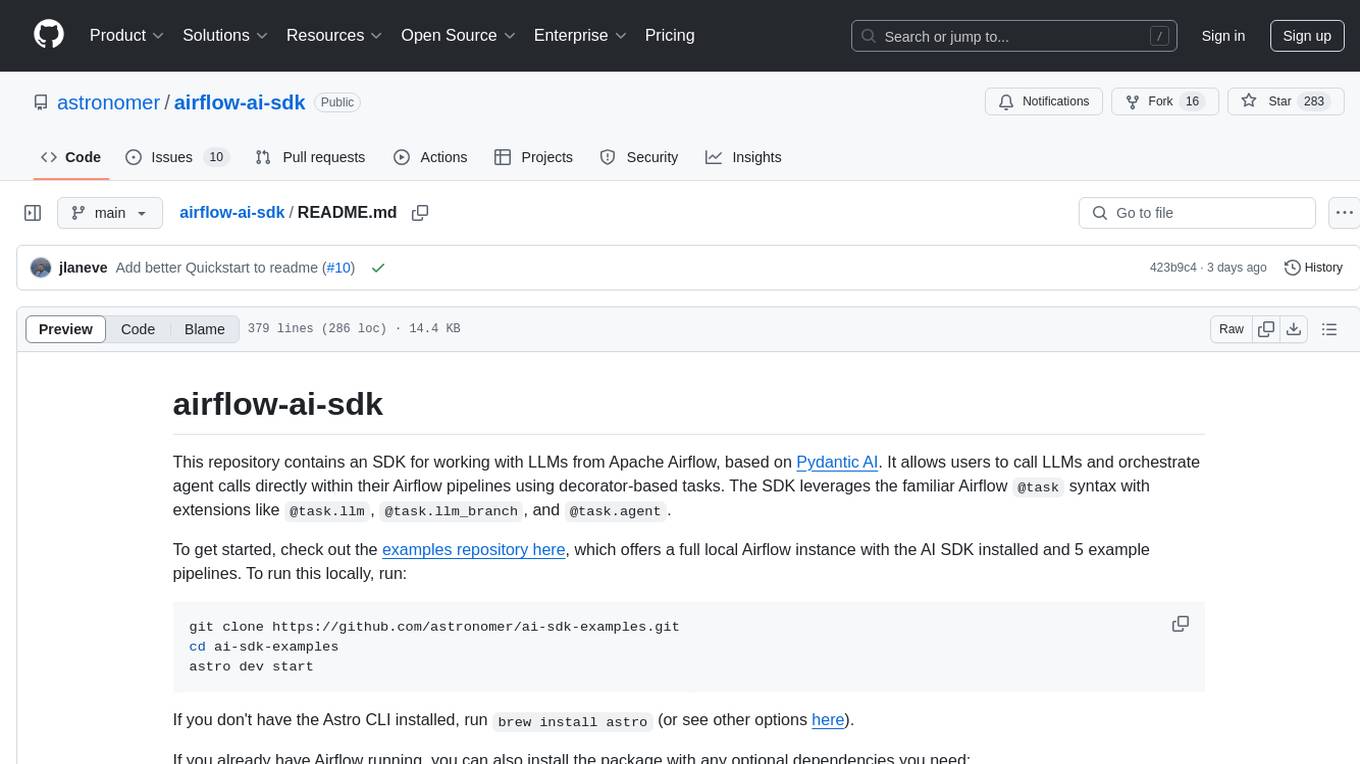
This repository contains an SDK for working with LLMs from Apache Airflow, based on Pydantic AI. It allows users to call LLMs and orchestrate agent calls directly within their Airflow pipelines using decorator-based tasks. The SDK leverages the familiar Airflow `@task` syntax with extensions like `@task.llm`, `@task.llm_branch`, and `@task.agent`. Users can define tasks that call language models, orchestrate multi-step AI reasoning, change the control flow of a DAG based on LLM output, and support various models in the Pydantic AI library. The SDK is designed to integrate LLM workflows into Airflow pipelines, from simple LLM calls to complex agentic workflows.
README:
This repository contains an SDK for working with LLMs from Apache Airflow, based on Pydantic AI. It allows users to call LLMs and orchestrate agent calls directly within their Airflow pipelines using decorator-based tasks. The SDK leverages the familiar Airflow @task syntax with extensions like @task.llm, @task.llm_branch, and @task.agent.
To get started, check out the examples repository here, which offers a full local Airflow instance with the AI SDK installed and 5 example pipelines. To run this locally, run:
git clone https://github.com/astronomer/ai-sdk-examples.git
cd ai-sdk-examples
astro dev startIf you don't have the Astro CLI installed, run brew install astro (or see other options here).
If you already have Airflow running, you can also install the package with any optional dependencies you need:
pip install airflow-ai-sdk[openai,duckduckgo]Note that installing the package with no optional dependencies will install the slim version of the package, which does not include any LLM models or tools. The available optional packages are listed here. While this SDK offers the optional dependencies for convenience sake, you can also install the optional dependencies from Pydantic AI directly.
Table of Contents:
-
LLM tasks with
@task.llm: Define tasks that call language models (e.g. GPT-3.5-turbo) to process text. -
Agent tasks with
@task.agent: Orchestrate multi-step AI reasoning by leveraging custom tools. - Automatic output parsing: Use function type hints (including Pydantic models) to automatically parse and validate LLM outputs.
-
Branching with
@task.llm_branch: Change the control flow of a DAG based on the output of an LLM. - Model support: Support for all models in the Pydantic AI library (OpenAI, Anthropic, Gemini, Ollama, Groq, Mistral, Cohere, Bedrock)
We follow the taskflow pattern of Airflow with three decorators:
-
@task.llm: Define a task that calls an LLM. Under the hood, this creates a Pydantic AIAgentwith no tools. -
@task.agent: Define a task that calls an agent. You can pass in a Pydantic AIAgentdirectly. -
@task.llm_branch: Define a task that branches the control flow of a DAG based on the output of an LLM. Enforces that the LLM output is one of the downstream task_ids.
The function supplied to each decorator is a translation function that converts the Airflow task's input into the LLM's input. If you don't want to do any translation, you can just return the input unchanged.
AI workflows are becoming increasingly common as organizations look for pragmatic ways to get value out of LLMs. As with any workflow, it's important to have a flexible and scalable way to orchestrate them.
Airflow is a popular choice for orchestrating data pipelines. It's a powerful tool for managing the dependencies between tasks and for scheduling and monitoring them, and has been trusted by data teams everywhere for 10+ years. It comes "batteries included" with a rich set of capabilities:
- Flexible scheduling: run tasks on a fixed schedule, on-demand, or based on external events
- Dynamic task mapping: easily process multiple inputs in parallel with full error handling and observability
- Branching and conditional logic: change the control flow of a DAG based on the output of certain tasks
- Error handling: built-in support for retries, exponential backoff, and timeouts
- Resource management: limit the concurrency of tasks with Airflow Pools
- Monitoring: detailed logs and monitoring capabilities
- Scalability: designed for production workflows
This SDK is designed to make it easy to integrate LLM workflows into your Airflow pipelines. It allows you to do anything from simple LLM calls to complex agentic workflows.
See the full set of examples in the examples/dags directory.
This example shows how to use the @task.llm decorator as part of an Airflow DAG. In the @task.llm decorator, we can
specify a model and system prompt. The decorator allows you to transform the Airflow task's input into the LLM's input.
See full example: github_changelog.py
import os
import pendulum
from airflow.decorators import dag, task
from github import Github
@task
def get_recent_commits(data_interval_start: pendulum.DateTime, data_interval_end: pendulum.DateTime) -> list[str]:
"""
This task returns a mocked list of recent commits. In a real workflow, this
task would get the recent commits from a database or API.
"""
print(f"Getting commits for {data_interval_start} to {data_interval_end}")
gh = Github(os.getenv("GITHUB_TOKEN"))
repo = gh.get_repo("apache/airflow")
commits = repo.get_commits(since=data_interval_start, until=data_interval_end)
return [f"{commit.commit.sha}: {commit.commit.message}" for commit in commits]
@task.llm(
model="gpt-4o-mini",
result_type=str,
system_prompt="""
Your job is to summarize the commits to the Airflow project given a week's worth
of commits. Pay particular attention to large changes and new features as opposed
to bug fixes and minor changes.
You don't need to include every commit, just the most important ones. Add a one line
overall summary of the changes at the top, followed by bullet points of the most
important changes.
Example output:
This week, we made architectural changes to the core scheduler to make it more
maintainable and easier to understand.
- Made the scheduler 20% faster (commit 1234567)
- Added a new task type: `example_task` (commit 1234568)
- Added a new operator: `example_operator` (commit 1234569)
- Added a new sensor: `example_sensor` (commit 1234570)
"""
)
def summarize_commits(commits: list[str] | None = None) -> str:
"""
This task summarizes the commits. You can add logic here to transform the input
before it gets passed to the LLM.
"""
# don't need to do any translation
return "\n".join(commits)
@task
def send_summaries(summaries: str):
...
@dag(
schedule="@weekly",
start_date=pendulum.datetime(2025, 3, 1, tz="UTC"),
catchup=False,
)
def github_changelog():
commits = get_recent_commits()
summaries = summarize_commits(commits=commits)
send_summaries(summaries)
github_changelog()This example demonstrates how to use the @task.llm decorator to call an LLM and return a structured output. In this
case, we're using a Pydantic model to validate the output of the LLM. We recommend using the airflow_ai_sdk.BaseModel
class to define your Pydantic models in case we add more functionality in the future.
See full example: product_feedback_summarization.py
import pendulum
from typing import Literal, Any
from airflow.decorators import dag, task
from airflow.exceptions import AirflowSkipException
import airflow_ai_sdk as ai_sdk
from include.pii import mask_pii
@task
def get_product_feedback() -> list[str]:
"""
This task returns a mocked list of product feedback. In a real workflow, this
task would get the product feedback from a database or API.
"""
...
class ProductFeedbackSummary(ai_sdk.BaseModel):
summary: str
sentiment: Literal["positive", "negative", "neutral"]
feature_requests: list[str]
@task.llm(
model="gpt-4o-mini",
result_type=ProductFeedbackSummary,
system_prompt="""
You are a helpful assistant that summarizes product feedback.
"""
)
def summarize_product_feedback(feedback: str | None = None) -> ProductFeedbackSummary:
"""
This task summarizes the product feedback. You can add logic here to transform the input
before summarizing it.
"""
# if the feedback doesn't mention Airflow, skip it
if "Airflow" not in feedback:
raise AirflowSkipException("Feedback does not mention Airflow")
# mask PII in the feedback
feedback = mask_pii(feedback)
return feedback
@task
def upload_summaries(summaries: list[dict[str, Any]]):
...
@dag(
schedule=None,
start_date=pendulum.datetime(2021, 1, 1, tz="UTC"),
catchup=False,
)
def product_feedback_summarization():
feedback = get_product_feedback()
summaries = summarize_product_feedback.expand(feedback=feedback)
upload_summaries(summaries)
product_feedback_summarization()This example shows how to build an AI agent that can autonomously invoke external tools (e.g., a knowledge base search) when answering a user question.
See full example: deep_research.py
import pendulum
import requests
from airflow.decorators import dag, task
from airflow.models.dagrun import DagRun
from airflow.models.param import Param
from bs4 import BeautifulSoup
from pydantic_ai import Agent
from pydantic_ai.common_tools.duckduckgo import duckduckgo_search_tool
# custom tool to get the content of a page
def get_page_content(url: str) -> str:
"""
Get the content of a page.
"""
response = requests.get(url)
soup = BeautifulSoup(response.text, "html.parser")
distillation_agent = Agent(
"gpt-4o-mini",
system_prompt="""
You are responsible for distilling information from a text. The summary will be used by a research agent to generate a research report.
Keep the summary concise and to the point, focusing on only key information.
""",
)
return distillation_agent.run_sync(soup.get_text())
deep_research_agent = Agent(
"o3-mini",
system_prompt="""
You are a deep research agent who is very skilled at distilling information from the web. You are given a query and your job is to generate a research report.
You can search the web by using the `duckduckgo_search_tool`. You can also use the `get_page_content` tool to get the contents of a page.
Keep going until you have enough information to generate a research report. Assume you know nothing about the query or contents, so you need to search the web for relevant information.
Do not generate new information, only distill information from the web.
""",
tools=[duckduckgo_search_tool(), get_page_content],
)
@task.agent(agent=deep_research_agent)
def deep_research_task(dag_run: DagRun) -> str:
"""
This task performs a deep research on the given query.
"""
query = dag_run.conf.get("query")
if not query:
raise ValueError("Query is required")
print(f"Performing deep research on {query}")
return query
@task
def upload_results(results: str):
...
@dag(
schedule=None,
start_date=pendulum.datetime(2025, 3, 1, tz="UTC"),
catchup=False,
params={
"query": Param(
type="string",
default="How has the field of data engineering evolved in the last 5 years?",
),
},
)
def deep_research():
results = deep_research_task()
upload_results(results)
deep_research()This example demonstrates how to use the @task.llm_branch decorator to change the control flow of a DAG based on the output of an LLM. In this case, we're routing support tickets based on the severity of the ticket.
See full example: support_ticket_routing.py
import pendulum
from airflow.decorators import dag, task
from airflow.models.dagrun import DagRun
@task.llm_branch(
model="gpt-4o-mini",
system_prompt="""
You are a support agent that routes support tickets based on the priority of the ticket.
Here are the priority definitions:
- P0: Critical issues that impact the user's ability to use the product, specifically for a production deployment.
- P1: Issues that impact the user's ability to use the product, but not as severely (or not for their production deployment).
- P2: Issues that are low priority and can wait until the next business day
- P3: Issues that are not important or time sensitive
Here are some examples of tickets and their priorities:
- "Our production deployment just went down because it ran out of memory. Please help.": P0
- "Our staging / dev / QA deployment just went down because it ran out of memory. Please help.": P1
- "I'm having trouble logging in to my account.": P1
- "The UI is not loading.": P1
- "I need help setting up my account.": P2
- "I have a question about the product.": P3
""",
allow_multiple_branches=True,
)
def route_ticket(dag_run: DagRun) -> str:
return dag_run.conf.get("ticket")
@task
def handle_p0_ticket(ticket: str):
print(f"Handling P0 ticket: {ticket}")
@task
def handle_p1_ticket(ticket: str):
print(f"Handling P1 ticket: {ticket}")
@task
def handle_p2_ticket(ticket: str):
print(f"Handling P2 ticket: {ticket}")
@task
def handle_p3_ticket(ticket: str):
print(f"Handling P3 ticket: {ticket}")
@dag(
start_date=pendulum.datetime(2025, 1, 1, tz="UTC"),
schedule=None,
catchup=False,
params={"ticket": "Hi, our production deployment just went down because it ran out of memory. Please help."}
)
def support_ticket_routing():
ticket = route_ticket()
handle_p0_ticket(ticket)
handle_p1_ticket(ticket)
handle_p2_ticket(ticket)
handle_p3_ticket(ticket)
support_ticket_routing()For Tasks:
Click tags to check more tools for each tasksFor Jobs:
Alternative AI tools for airflow-ai-sdk
Similar Open Source Tools

airflow-ai-sdk
This repository contains an SDK for working with LLMs from Apache Airflow, based on Pydantic AI. It allows users to call LLMs and orchestrate agent calls directly within their Airflow pipelines using decorator-based tasks. The SDK leverages the familiar Airflow `@task` syntax with extensions like `@task.llm`, `@task.llm_branch`, and `@task.agent`. Users can define tasks that call language models, orchestrate multi-step AI reasoning, change the control flow of a DAG based on LLM output, and support various models in the Pydantic AI library. The SDK is designed to integrate LLM workflows into Airflow pipelines, from simple LLM calls to complex agentic workflows.
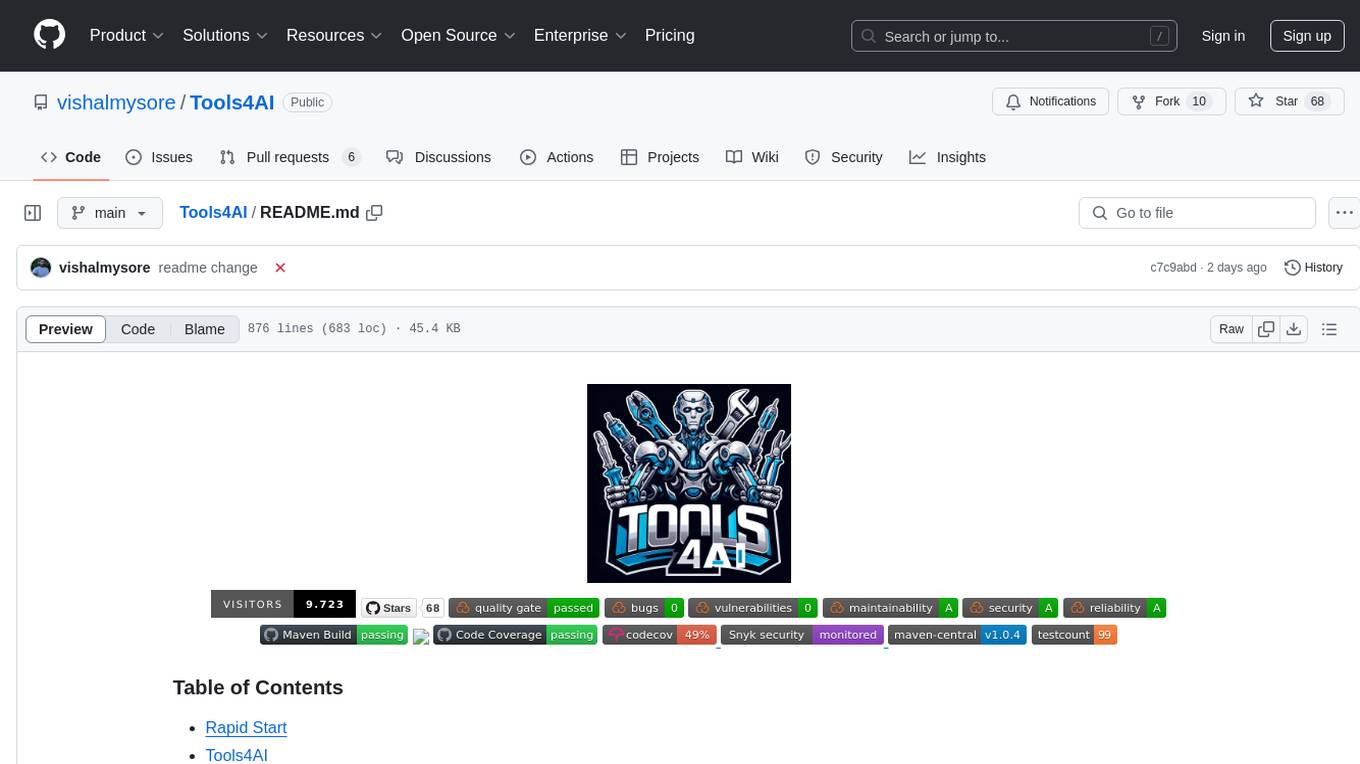
Tools4AI
Tools4AI is a Java-based Agentic Framework for building AI agents to integrate with enterprise Java applications. It enables the conversion of natural language prompts into actionable behaviors, streamlining user interactions with complex systems. By leveraging AI capabilities, it enhances productivity and innovation across diverse applications. The framework allows for seamless integration of AI with various systems, such as customer service applications, to interpret user requests, trigger actions, and streamline workflows. Prompt prediction anticipates user actions based on input prompts, enhancing user experience by proactively suggesting relevant actions or services based on context.
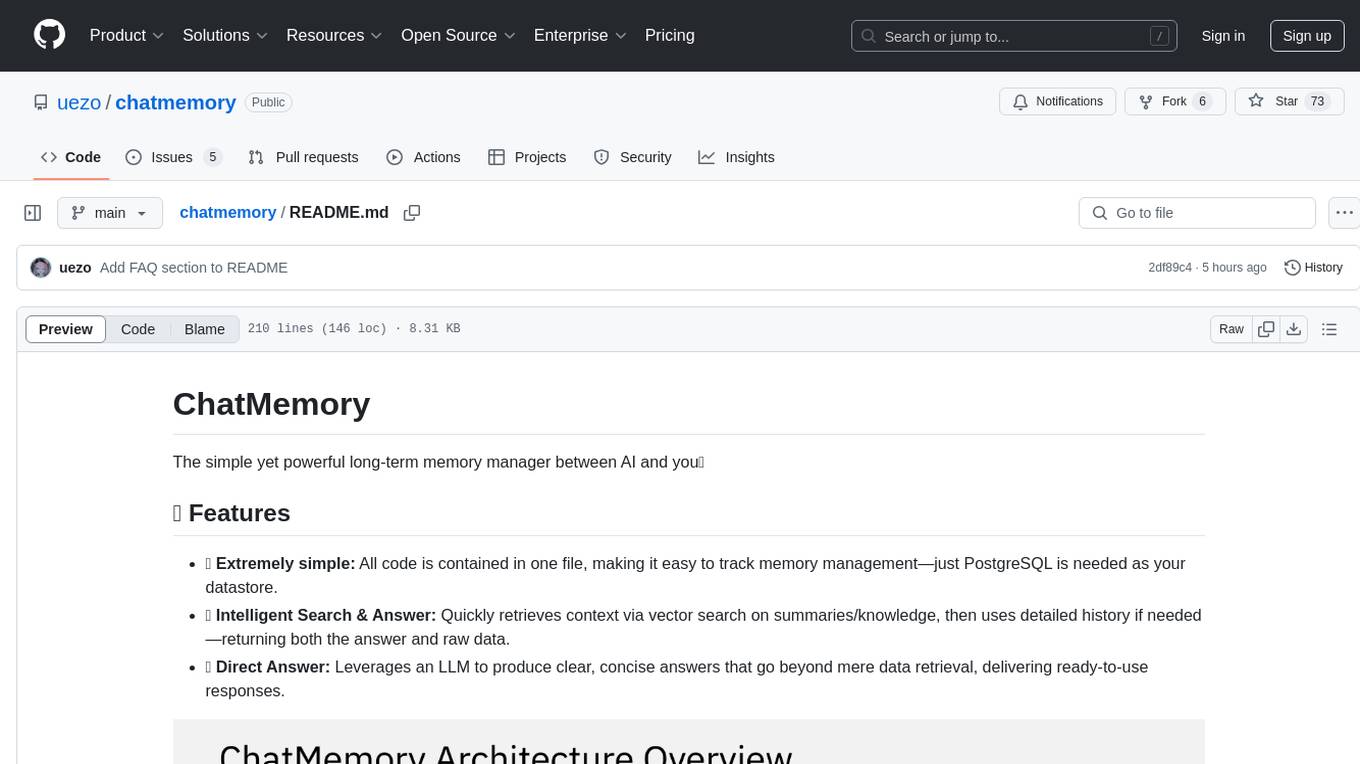
chatmemory
ChatMemory is a simple yet powerful long-term memory manager that facilitates communication between AI and users. It organizes conversation data into history, summary, and knowledge entities, enabling quick retrieval of context and generation of clear, concise answers. The tool leverages vector search on summaries/knowledge and detailed history to provide accurate responses. It balances speed and accuracy by using lightweight retrieval and fallback detailed search mechanisms, ensuring efficient memory management and response generation beyond mere data retrieval.
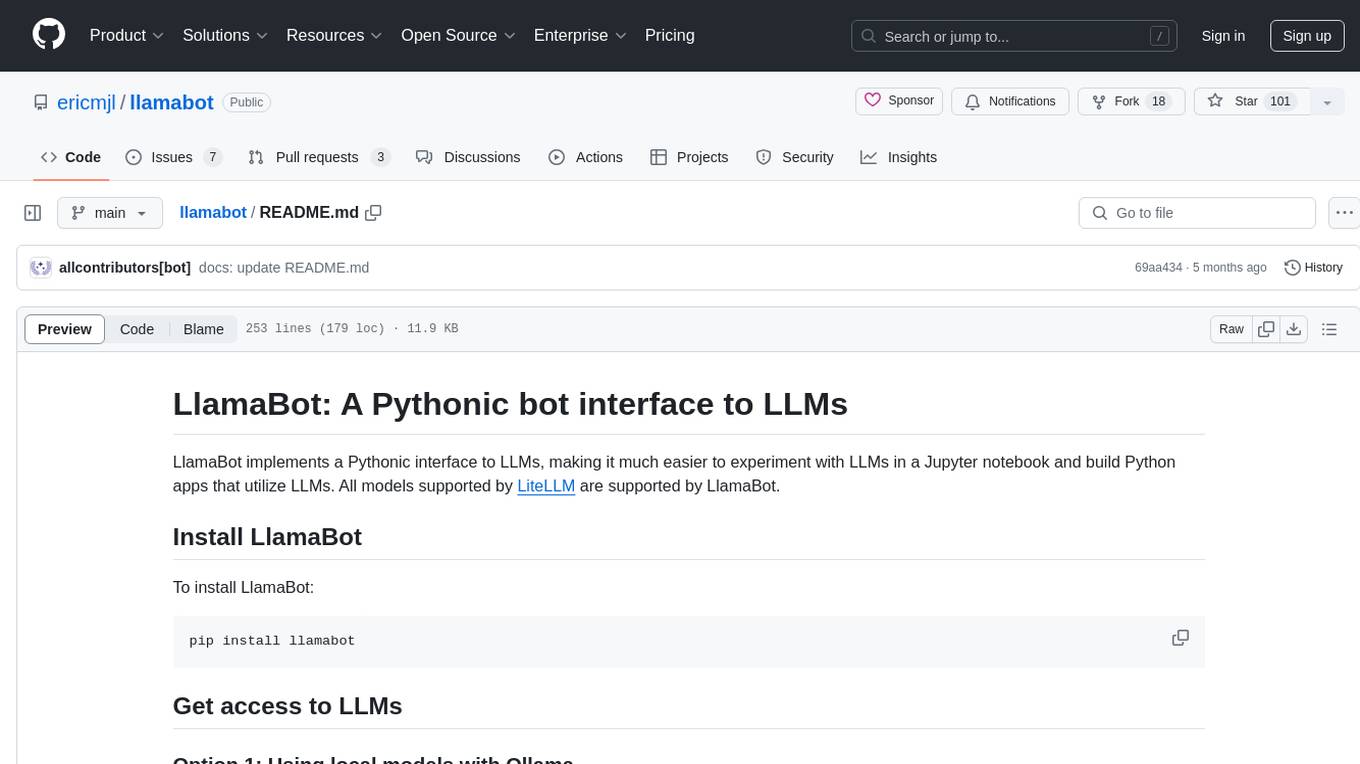
llamabot
LlamaBot is a Pythonic bot interface to Large Language Models (LLMs), providing an easy way to experiment with LLMs in Jupyter notebooks and build Python apps utilizing LLMs. It supports all models available in LiteLLM. Users can access LLMs either through local models with Ollama or by using API providers like OpenAI and Mistral. LlamaBot offers different bot interfaces like SimpleBot, ChatBot, QueryBot, and ImageBot for various tasks such as rephrasing text, maintaining chat history, querying documents, and generating images. The tool also includes CLI demos showcasing its capabilities and supports contributions for new features and bug reports from the community.
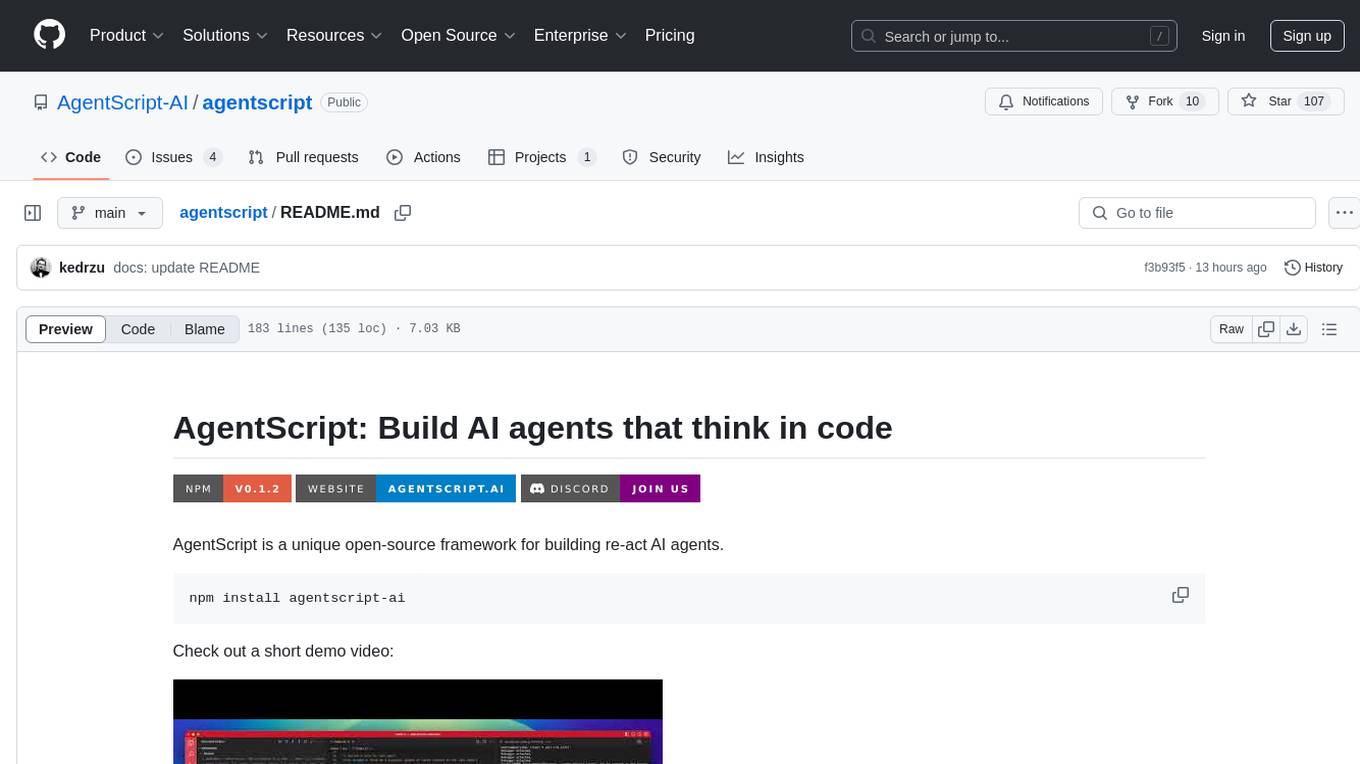
agentscript
AgentScript is an open-source framework for building AI agents that think in code. It prompts a language model to generate JavaScript code, which is then executed in a dedicated runtime with resumability, state persistence, and interactivity. The framework allows for abstract task execution without needing to know all the data beforehand, making it flexible and efficient. AgentScript supports tools, deterministic functions, and LLM-enabled functions, enabling dynamic data processing and decision-making. It also provides state management and human-in-the-loop capabilities, allowing for pausing, serialization, and resumption of execution.
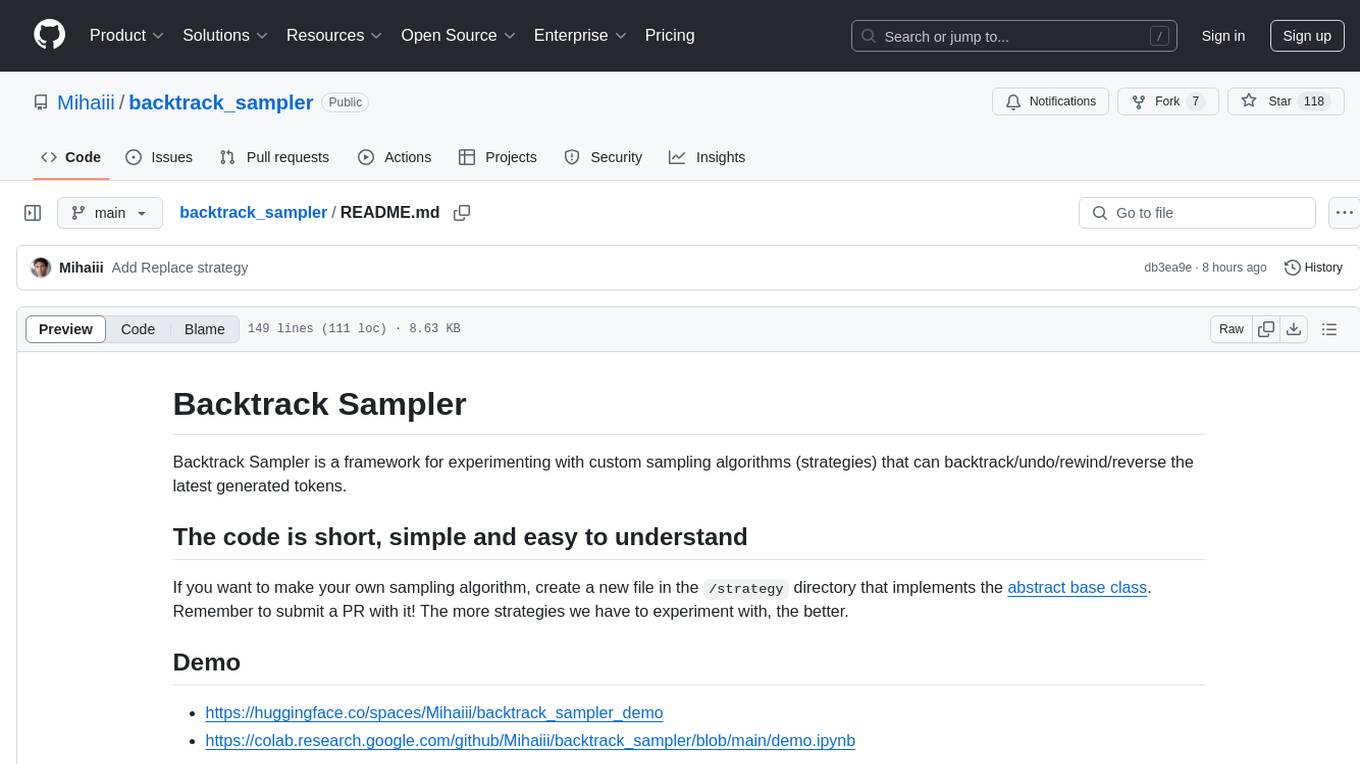
backtrack_sampler
Backtrack Sampler is a framework for experimenting with custom sampling algorithms that can backtrack the latest generated tokens. It provides a simple and easy-to-understand codebase for creating new sampling strategies. Users can implement their own strategies by creating new files in the `/strategy` directory. The repo includes examples for usage with llama.cpp and transformers, showcasing different strategies like Creative Writing, Anti-slop, Debug, Human Guidance, Adaptive Temperature, and Replace. The goal is to encourage experimentation and customization of backtracking algorithms for language models.
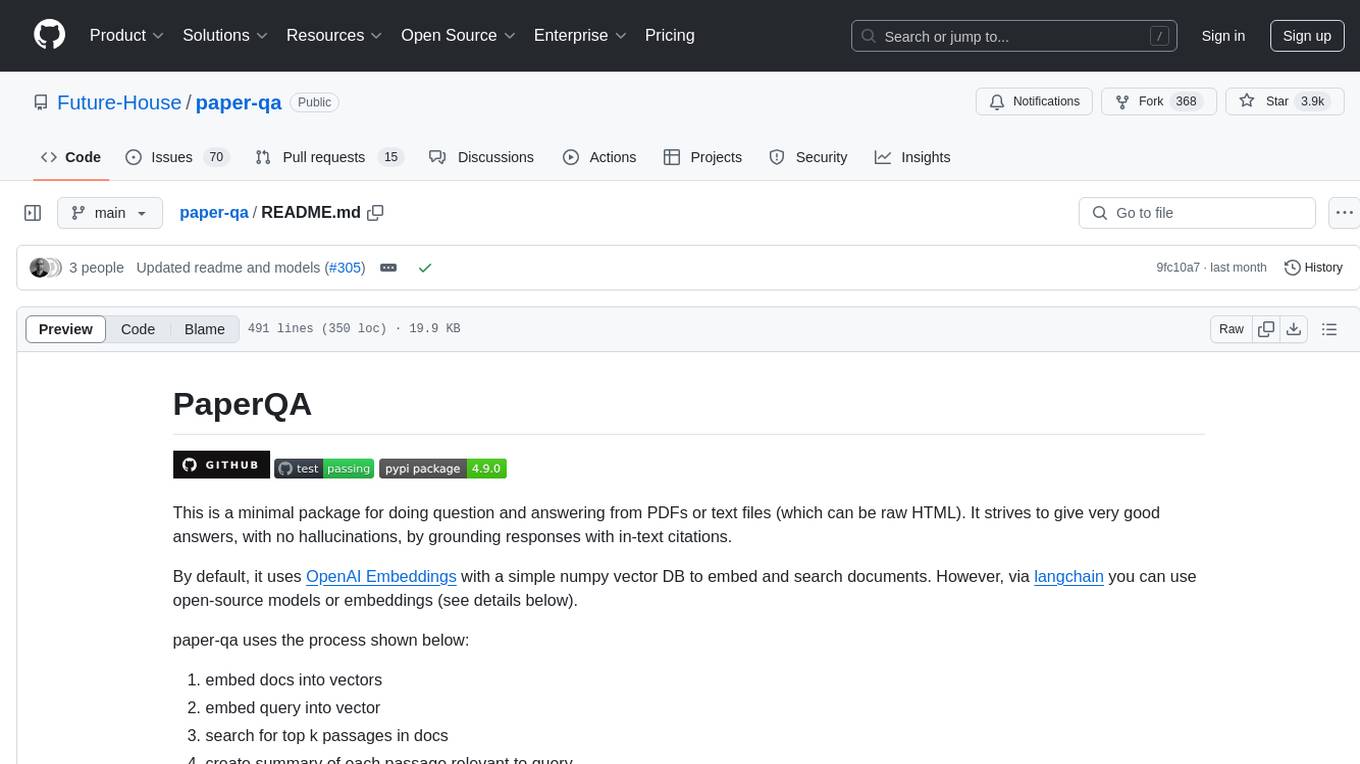
paper-qa
PaperQA is a minimal package for question and answering from PDFs or text files, providing very good answers with in-text citations. It uses OpenAI Embeddings to embed and search documents, and includes a process of embedding docs, queries, searching for top passages, creating summaries, using an LLM to re-score and select relevant summaries, putting summaries into prompt, and generating answers. The tool can be used to answer specific questions related to scientific research by leveraging citations and relevant passages from documents.
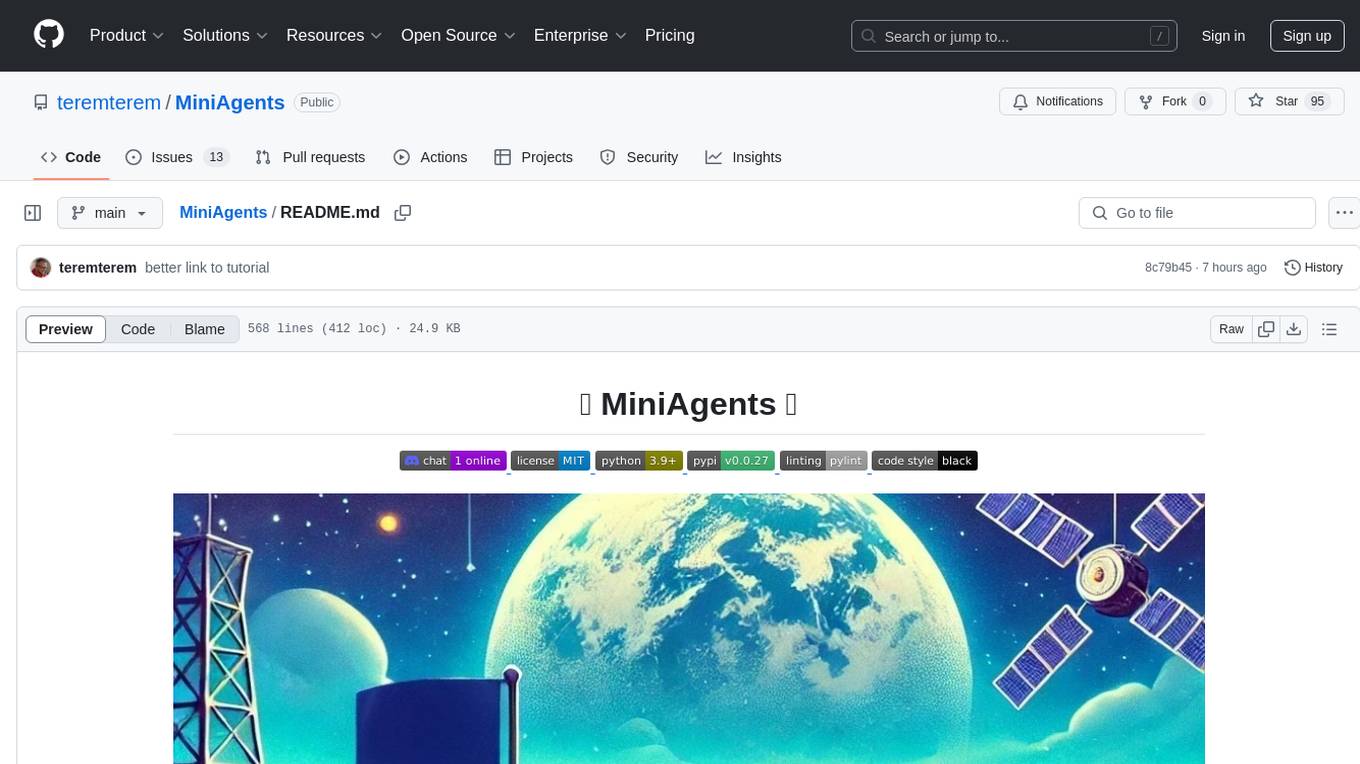
MiniAgents
MiniAgents is an open-source Python framework designed to simplify the creation of multi-agent AI systems. It offers a parallelism and async-first design, allowing users to focus on building intelligent agents while handling concurrency challenges. The framework, built on asyncio, supports LLM-based applications with immutable messages and seamless asynchronous token and message streaming between agents.
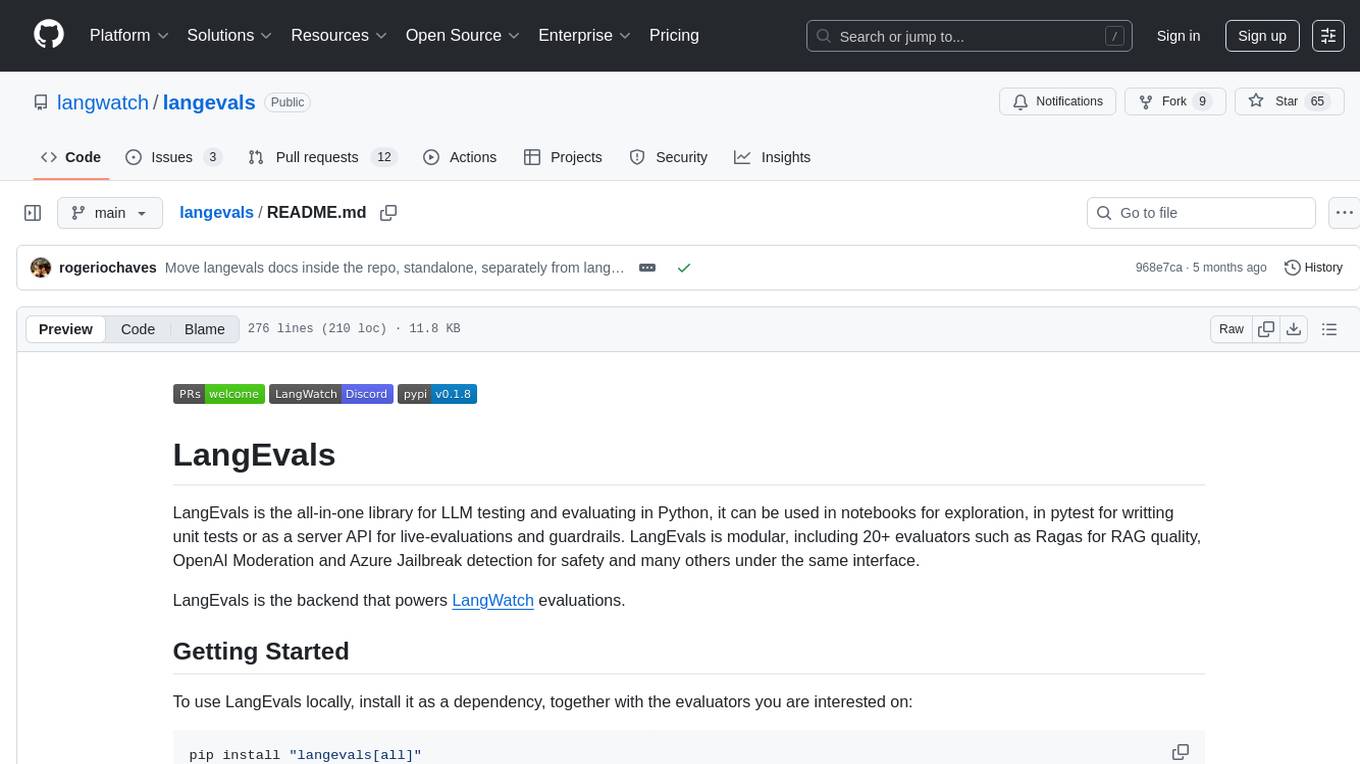
langevals
LangEvals is an all-in-one Python library for testing and evaluating LLM models. It can be used in notebooks for exploration, in pytest for writing unit tests, or as a server API for live evaluations and guardrails. The library is modular, with 20+ evaluators including Ragas for RAG quality, OpenAI Moderation, and Azure Jailbreak detection. LangEvals powers LangWatch evaluations and provides tools for batch evaluations on notebooks and unit test evaluations with PyTest. It also offers LangEvals evaluators for LLM-as-a-Judge scenarios and out-of-the-box evaluators for language detection and answer relevancy checks.
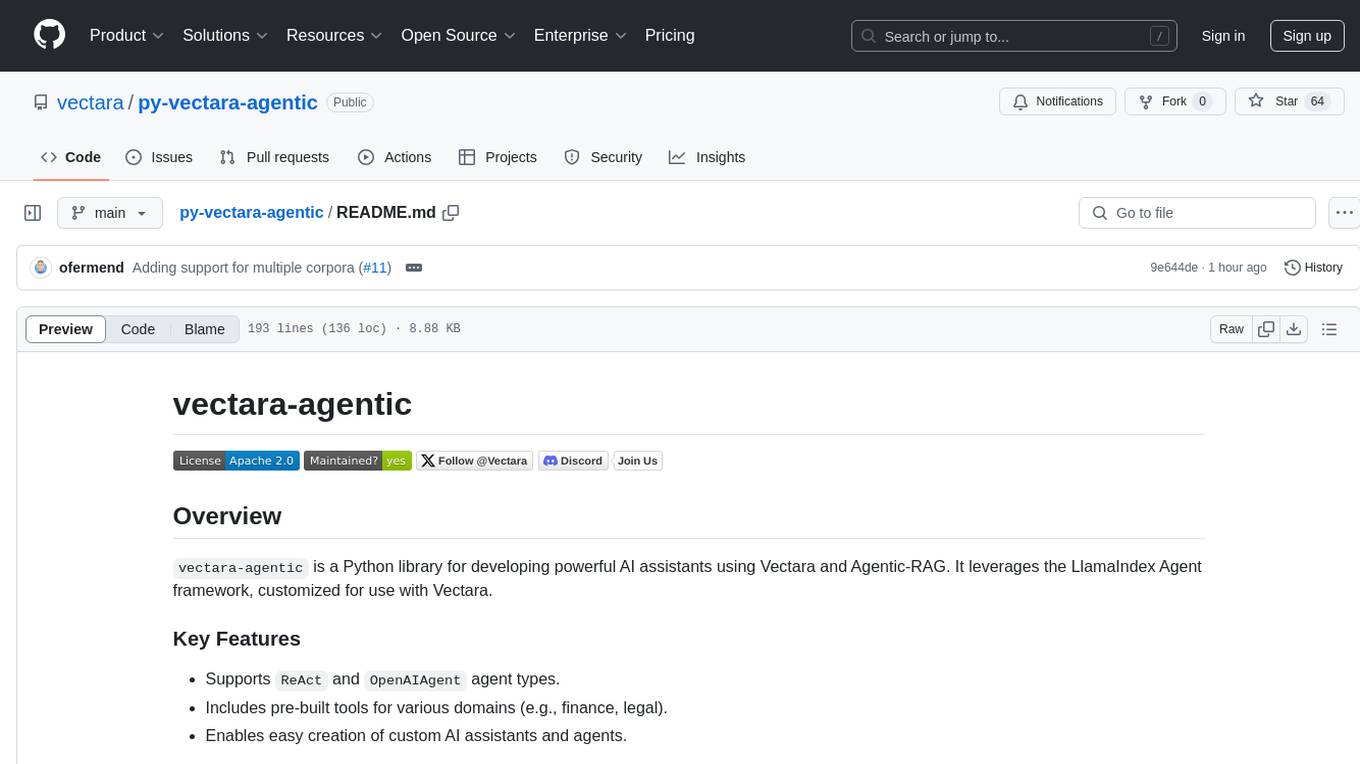
py-vectara-agentic
The `vectara-agentic` Python library is designed for developing powerful AI assistants using Vectara and Agentic-RAG. It supports various agent types, includes pre-built tools for domains like finance and legal, and enables easy creation of custom AI assistants and agents. The library provides tools for summarizing text, rephrasing text, legal tasks like summarizing legal text and critiquing as a judge, financial tasks like analyzing balance sheets and income statements, and database tools for inspecting and querying databases. It also supports observability via LlamaIndex and Arize Phoenix integration.
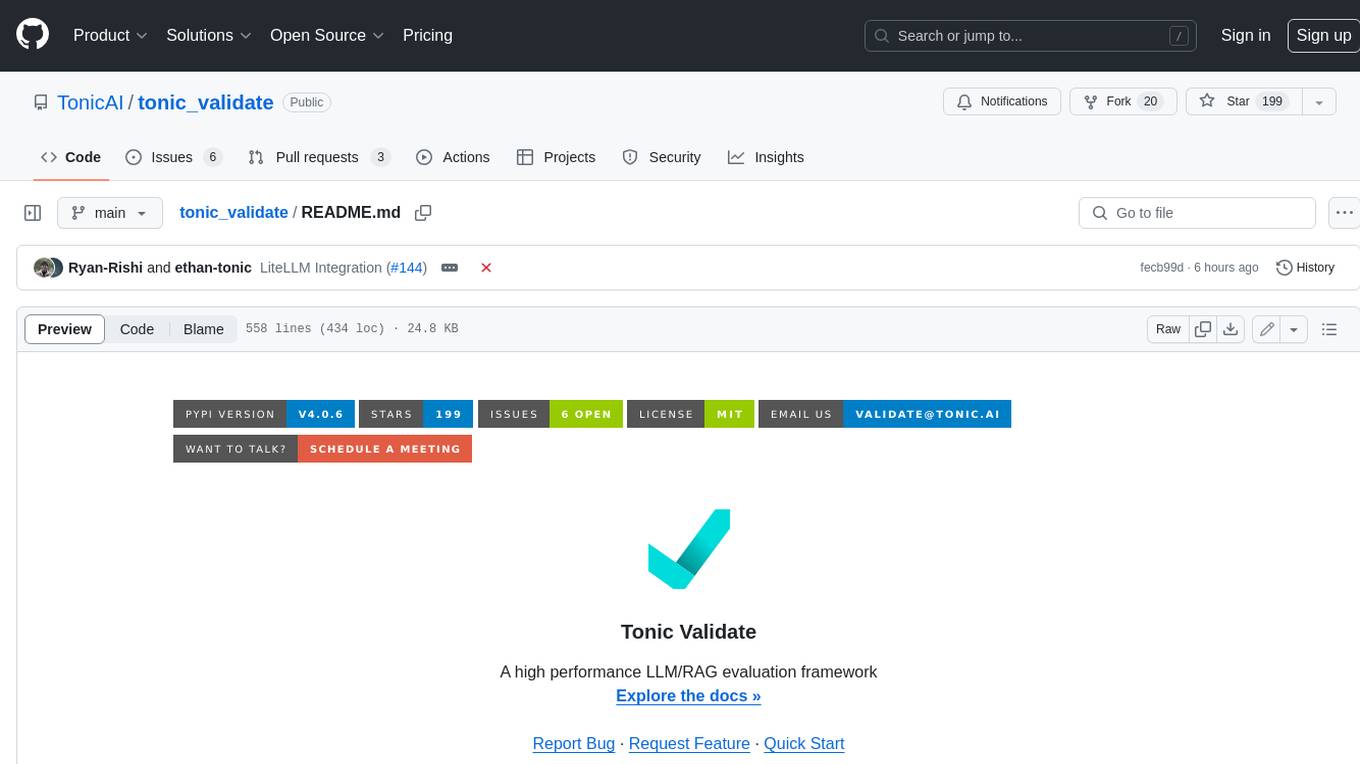
tonic_validate
Tonic Validate is a framework for the evaluation of LLM outputs, such as Retrieval Augmented Generation (RAG) pipelines. Validate makes it easy to evaluate, track, and monitor your LLM and RAG applications. Validate allows you to evaluate your LLM outputs through the use of our provided metrics which measure everything from answer correctness to LLM hallucination. Additionally, Validate has an optional UI to visualize your evaluation results for easy tracking and monitoring.

mosec
Mosec is a high-performance and flexible model serving framework for building ML model-enabled backend and microservices. It bridges the gap between any machine learning models you just trained and the efficient online service API. * **Highly performant** : web layer and task coordination built with Rust 🦀, which offers blazing speed in addition to efficient CPU utilization powered by async I/O * **Ease of use** : user interface purely in Python 🐍, by which users can serve their models in an ML framework-agnostic manner using the same code as they do for offline testing * **Dynamic batching** : aggregate requests from different users for batched inference and distribute results back * **Pipelined stages** : spawn multiple processes for pipelined stages to handle CPU/GPU/IO mixed workloads * **Cloud friendly** : designed to run in the cloud, with the model warmup, graceful shutdown, and Prometheus monitoring metrics, easily managed by Kubernetes or any container orchestration systems * **Do one thing well** : focus on the online serving part, users can pay attention to the model optimization and business logic
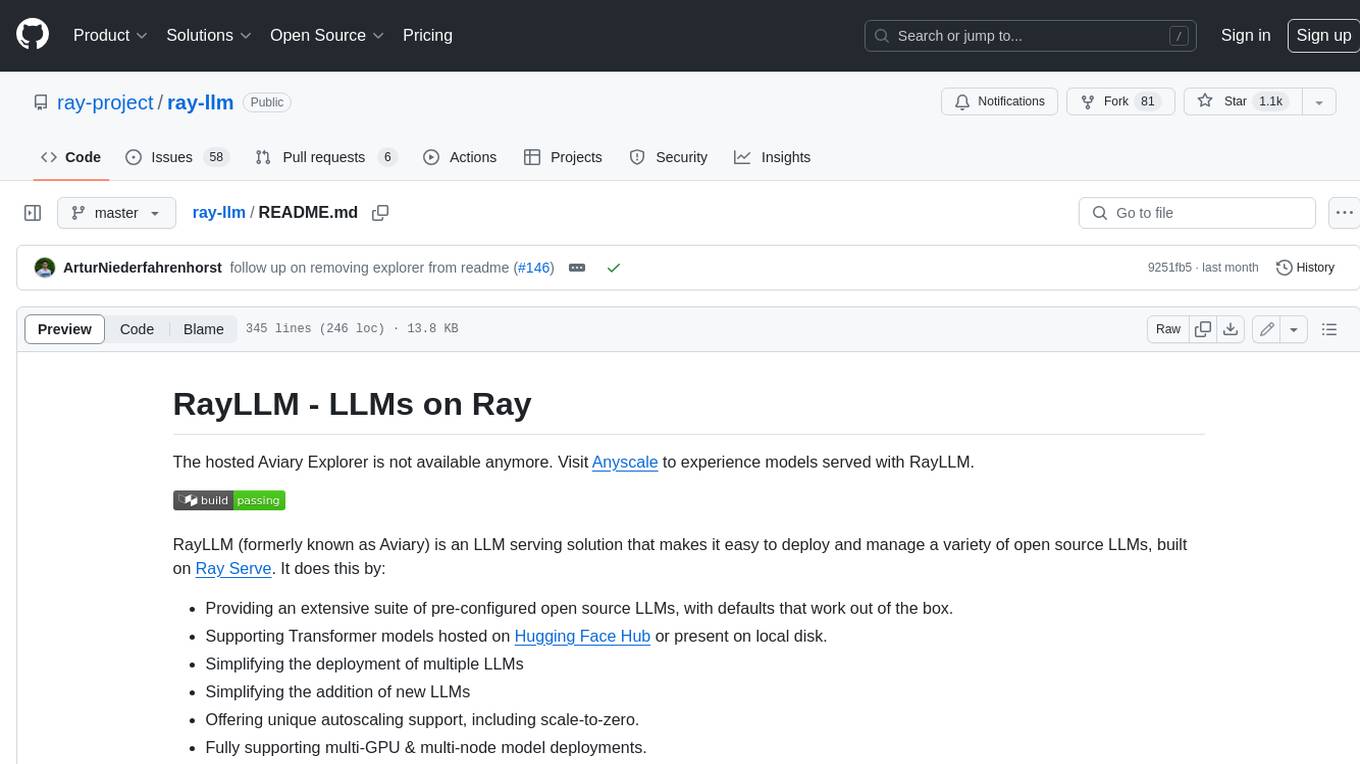
ray-llm
RayLLM (formerly known as Aviary) is an LLM serving solution that makes it easy to deploy and manage a variety of open source LLMs, built on Ray Serve. It provides an extensive suite of pre-configured open source LLMs, with defaults that work out of the box. RayLLM supports Transformer models hosted on Hugging Face Hub or present on local disk. It simplifies the deployment of multiple LLMs, the addition of new LLMs, and offers unique autoscaling support, including scale-to-zero. RayLLM fully supports multi-GPU & multi-node model deployments and offers high performance features like continuous batching, quantization and streaming. It provides a REST API that is similar to OpenAI's to make it easy to migrate and cross test them. RayLLM supports multiple LLM backends out of the box, including vLLM and TensorRT-LLM.
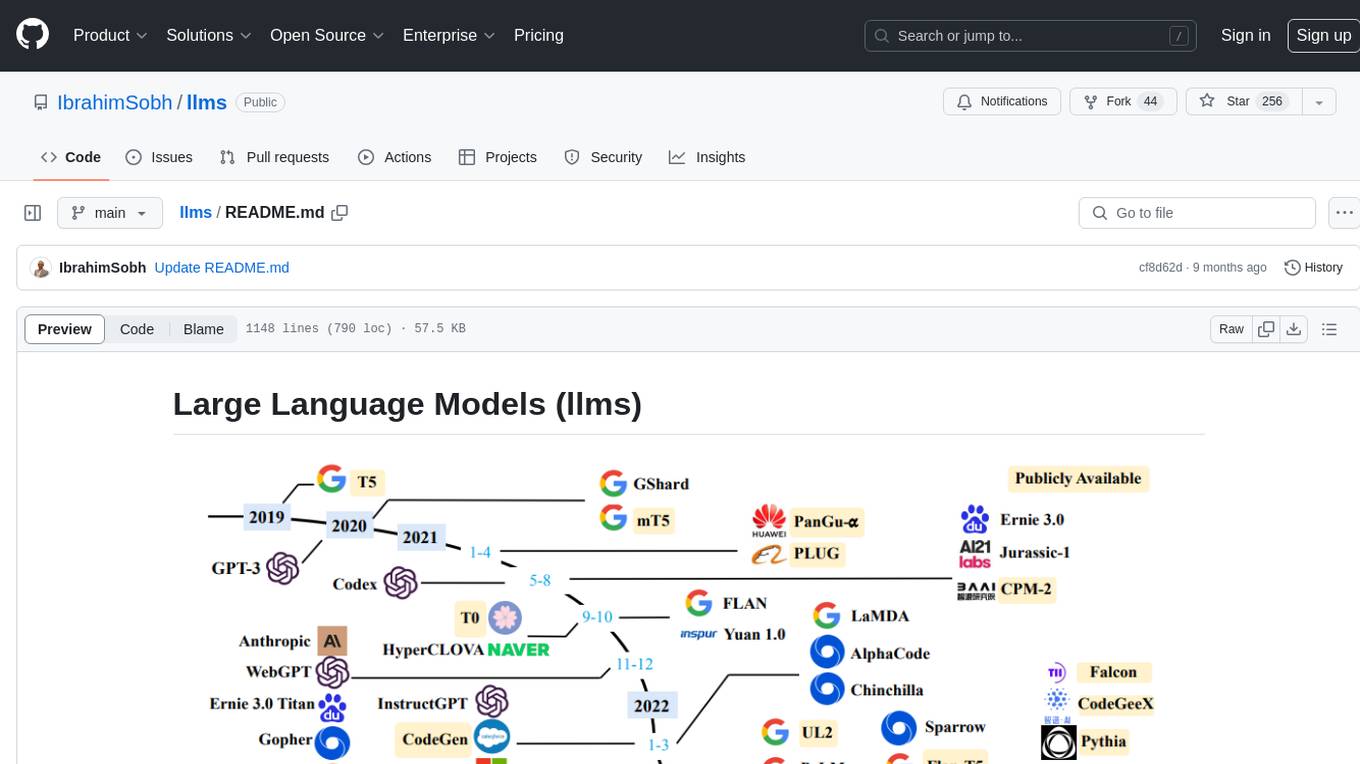
llms
The 'llms' repository is a comprehensive guide on Large Language Models (LLMs), covering topics such as language modeling, applications of LLMs, statistical language modeling, neural language models, conditional language models, evaluation methods, transformer-based language models, practical LLMs like GPT and BERT, prompt engineering, fine-tuning LLMs, retrieval augmented generation, AI agents, and LLMs for computer vision. The repository provides detailed explanations, examples, and tools for working with LLMs.
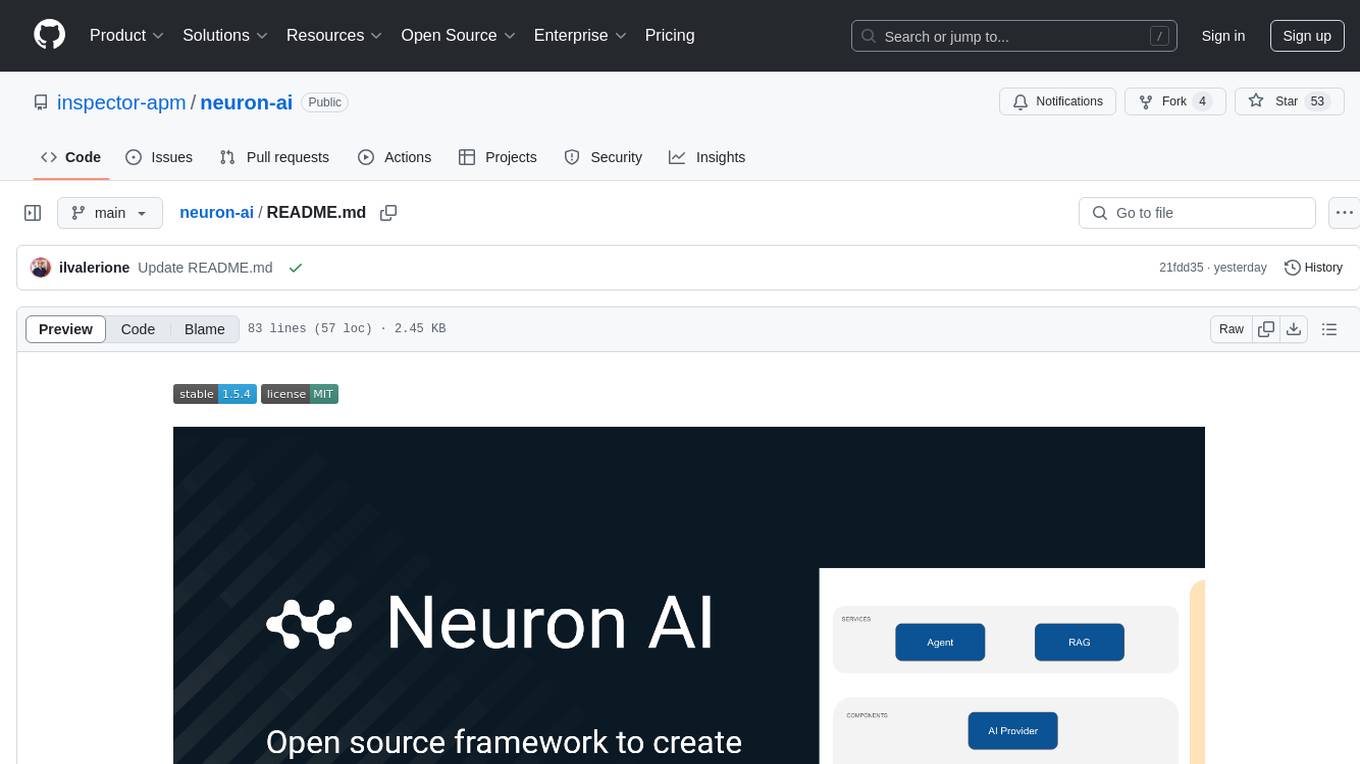
neuron-ai
Neuron AI is a PHP framework that provides an Agent class for creating fully functional agents to perform tasks like analyzing text for SEO optimization. The framework manages advanced mechanisms such as memory, tools, and function calls. Users can extend the Agent class to create custom agents and interact with them to get responses based on the underlying LLM. Neuron AI aims to simplify the development of AI-powered applications by offering a structured framework with documentation and guidelines for contributions under the MIT license.
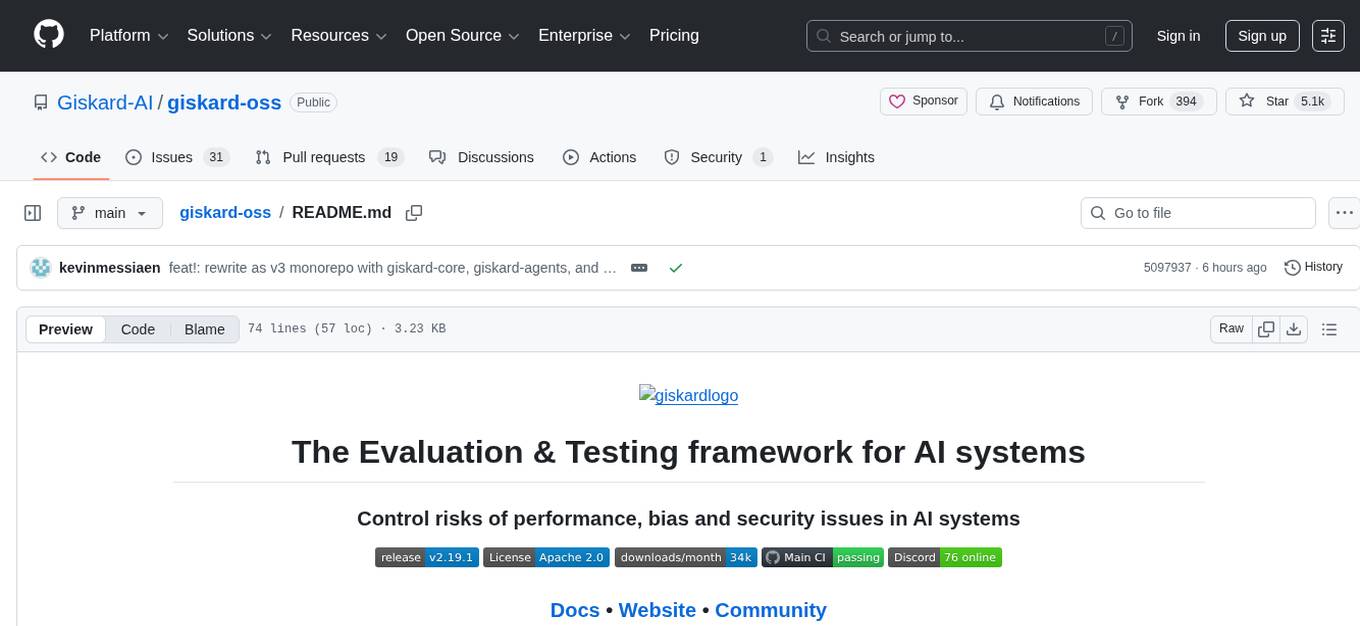
giskard-oss
Giskard-oss is an Evaluation & Testing framework for AI systems that aims to control risks of performance, bias, and security issues. It focuses on LLM systems, with plans for a new scan and a rewrite of RAGET for version 3. The repository is structured as a Python workspace with three packages: giskard-core, giskard-checks, and giskard-agents. Developers can use the Makefile for common tasks, and contributions from the AI community are welcome. The project encourages stars for visibility and offers sponsorship options for support.
For similar tasks

airflow-ai-sdk
This repository contains an SDK for working with LLMs from Apache Airflow, based on Pydantic AI. It allows users to call LLMs and orchestrate agent calls directly within their Airflow pipelines using decorator-based tasks. The SDK leverages the familiar Airflow `@task` syntax with extensions like `@task.llm`, `@task.llm_branch`, and `@task.agent`. Users can define tasks that call language models, orchestrate multi-step AI reasoning, change the control flow of a DAG based on LLM output, and support various models in the Pydantic AI library. The SDK is designed to integrate LLM workflows into Airflow pipelines, from simple LLM calls to complex agentic workflows.
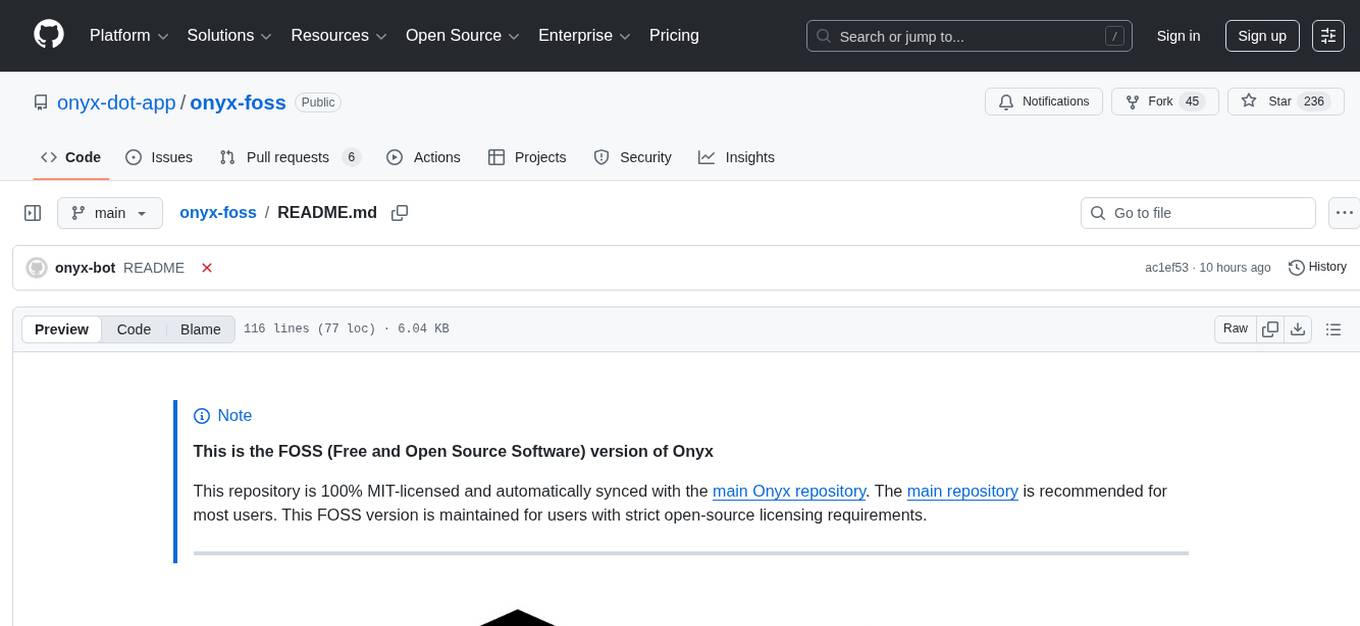
onyx-foss
Onyx is an open-source AI platform that offers a feature-rich, self-hostable Chat UI with advanced features like custom agents, web search, RAG, connectors to 40+ knowledge sources, deep research, code interpreter, image generation, collaboration tools, and more. It works with various LLMs and self-hosted LLMs, providing users with a versatile and powerful tool for AI-related tasks.
For similar jobs

promptflow
**Prompt flow** is a suite of development tools designed to streamline the end-to-end development cycle of LLM-based AI applications, from ideation, prototyping, testing, evaluation to production deployment and monitoring. It makes prompt engineering much easier and enables you to build LLM apps with production quality.

deepeval
DeepEval is a simple-to-use, open-source LLM evaluation framework specialized for unit testing LLM outputs. It incorporates various metrics such as G-Eval, hallucination, answer relevancy, RAGAS, etc., and runs locally on your machine for evaluation. It provides a wide range of ready-to-use evaluation metrics, allows for creating custom metrics, integrates with any CI/CD environment, and enables benchmarking LLMs on popular benchmarks. DeepEval is designed for evaluating RAG and fine-tuning applications, helping users optimize hyperparameters, prevent prompt drifting, and transition from OpenAI to hosting their own Llama2 with confidence.

MegaDetector
MegaDetector is an AI model that identifies animals, people, and vehicles in camera trap images (which also makes it useful for eliminating blank images). This model is trained on several million images from a variety of ecosystems. MegaDetector is just one of many tools that aims to make conservation biologists more efficient with AI. If you want to learn about other ways to use AI to accelerate camera trap workflows, check out our of the field, affectionately titled "Everything I know about machine learning and camera traps".

leapfrogai
LeapfrogAI is a self-hosted AI platform designed to be deployed in air-gapped resource-constrained environments. It brings sophisticated AI solutions to these environments by hosting all the necessary components of an AI stack, including vector databases, model backends, API, and UI. LeapfrogAI's API closely matches that of OpenAI, allowing tools built for OpenAI/ChatGPT to function seamlessly with a LeapfrogAI backend. It provides several backends for various use cases, including llama-cpp-python, whisper, text-embeddings, and vllm. LeapfrogAI leverages Chainguard's apko to harden base python images, ensuring the latest supported Python versions are used by the other components of the stack. The LeapfrogAI SDK provides a standard set of protobuffs and python utilities for implementing backends and gRPC. LeapfrogAI offers UI options for common use-cases like chat, summarization, and transcription. It can be deployed and run locally via UDS and Kubernetes, built out using Zarf packages. LeapfrogAI is supported by a community of users and contributors, including Defense Unicorns, Beast Code, Chainguard, Exovera, Hypergiant, Pulze, SOSi, United States Navy, United States Air Force, and United States Space Force.

llava-docker
This Docker image for LLaVA (Large Language and Vision Assistant) provides a convenient way to run LLaVA locally or on RunPod. LLaVA is a powerful AI tool that combines natural language processing and computer vision capabilities. With this Docker image, you can easily access LLaVA's functionalities for various tasks, including image captioning, visual question answering, text summarization, and more. The image comes pre-installed with LLaVA v1.2.0, Torch 2.1.2, xformers 0.0.23.post1, and other necessary dependencies. You can customize the model used by setting the MODEL environment variable. The image also includes a Jupyter Lab environment for interactive development and exploration. Overall, this Docker image offers a comprehensive and user-friendly platform for leveraging LLaVA's capabilities.

carrot
The 'carrot' repository on GitHub provides a list of free and user-friendly ChatGPT mirror sites for easy access. The repository includes sponsored sites offering various GPT models and services. Users can find and share sites, report errors, and access stable and recommended sites for ChatGPT usage. The repository also includes a detailed list of ChatGPT sites, their features, and accessibility options, making it a valuable resource for ChatGPT users seeking free and unlimited GPT services.

TrustLLM
TrustLLM is a comprehensive study of trustworthiness in LLMs, including principles for different dimensions of trustworthiness, established benchmark, evaluation, and analysis of trustworthiness for mainstream LLMs, and discussion of open challenges and future directions. Specifically, we first propose a set of principles for trustworthy LLMs that span eight different dimensions. Based on these principles, we further establish a benchmark across six dimensions including truthfulness, safety, fairness, robustness, privacy, and machine ethics. We then present a study evaluating 16 mainstream LLMs in TrustLLM, consisting of over 30 datasets. The document explains how to use the trustllm python package to help you assess the performance of your LLM in trustworthiness more quickly. For more details about TrustLLM, please refer to project website.

AI-YinMei
AI-YinMei is an AI virtual anchor Vtuber development tool (N card version). It supports fastgpt knowledge base chat dialogue, a complete set of solutions for LLM large language models: [fastgpt] + [one-api] + [Xinference], supports docking bilibili live broadcast barrage reply and entering live broadcast welcome speech, supports Microsoft edge-tts speech synthesis, supports Bert-VITS2 speech synthesis, supports GPT-SoVITS speech synthesis, supports expression control Vtuber Studio, supports painting stable-diffusion-webui output OBS live broadcast room, supports painting picture pornography public-NSFW-y-distinguish, supports search and image search service duckduckgo (requires magic Internet access), supports image search service Baidu image search (no magic Internet access), supports AI reply chat box [html plug-in], supports AI singing Auto-Convert-Music, supports playlist [html plug-in], supports dancing function, supports expression video playback, supports head touching action, supports gift smashing action, supports singing automatic start dancing function, chat and singing automatic cycle swing action, supports multi scene switching, background music switching, day and night automatic switching scene, supports open singing and painting, let AI automatically judge the content.